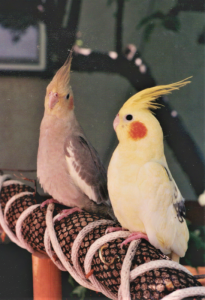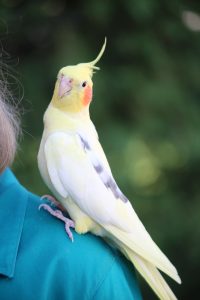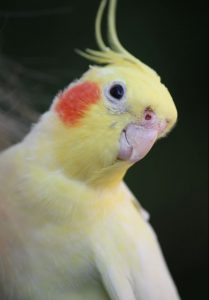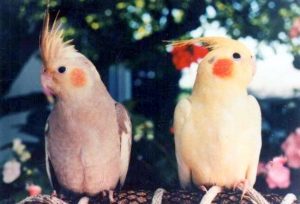
By Linda Anderson, Minnesota
Many years ago my husband, Allen, and I had the joy of hearing Sri Harold Klemp give a talk at an ECK Worldwide Seminar in which he told stories about our family’s birds. In “Sunshine and Sparkle,” chapter 1 of The Secret of Love, he’s quoted as saying,
Remember the two cockatiels—Sunshine and Sparkle. If we are truly aware of the hand of the Divine Spirit in our daily lives, we would feel like Sunshine and Sparkle more often. We would carry this attitude with us in our daily lives.
We would learn to put two and two together spiritually, to put the spiritual laws together into spiritual order so that they will work for us in our own lives.
Sri Harold’s words got me thinking about all the ways I’ve seen spiritual laws in action through these birds and other pet family members. I looked through Sri Harold Klemp’s wonderful book The Spiritual Laws of Life and found parallels—how the lives of Sunshine and Sparkle demonstrated the fulfillment of spiritual laws.
All the spiritual laws and their definitions in the following sections can be found in the book The Spiritual Laws of Life. Page numbers are next to the quotes, in case you want to read more about and contemplate on the profound spiritual laws that underlie all creation.
The Law of Gratitude
Allen and I feel we have much to be grateful for in spending nearly three decades with our beautiful yellow cockatiel, Sunshine—an intelligent, conscious, personality-filled bird. He knows what he wants when he wants it and doesn’t have any hesitation about expressing whatever is on his mind.
The definition given for the Law of Gratitude is that “abundance flourishes in a grateful heart; gratitude is the secret of love” ( p. 169). Sunshine is an example of an abundant life flourishing with constant gratitude, expressed through his singing, whistles, words, and playful sense of humor.
Sunshine has had an abundant life. Cockatiels tend to live at least ten to fifteen years, with fifteen being their average life span. Occasionally a cockatiel will make it to the ripe old age of thirty or more. Sunshine is twenty-eight years young at this time.
When he was younger, he used to talk to us and play tricks. His favorite game with the dog was to call her from the back porch by imitating Allen’s whistle. When the dog came bounding to the back door, Sunshine would quickly go silent. Confused, the dog looked all over for Allen to let her back into the house.
A shining example of abundance in Sunshine’s vocabulary was that each morning he greeted us with the words “I love you, sweet baby” followed by a kissing sound. He’d even say the phrase to our cats and the dog. Maybe he hoped they’d return his affection.
Back in the day when we had a landline phone and a fax machine, he’d imitate the two different ring tones. Before we had broadband, he’d make the sound of AOL downloading on the computer by singing every note of its melody. His favorite amusement was to make the phone “ring” and watch us run from another part of the house to answer it. As soon as we picked up the receiver and heard a dial tone, he’d say, “Hello,” and then make a clicking sound as if he (the caller) had hung up.
The Law of Growth
Sunshine continues to be an independent thinker even in his old age. He decides, on his terms and timetable, when he’s ready to go to our living-room fireplace mantel each morning. He regards our opening the door to his cage as simply an invitation, not a command. When he is ready, he ventures off his perch.
 Sunshine is too old to fly now, so I place him on my shoulder for transport. (Always reminds me of lyrics in a classic ballad: “Sunshine on my shoulders makes me happy.”) His aging serves as a reminder of the Law of Spiritual Growth. The Spiritual Laws of Life says, “The Law of Growth in the lower worlds demands that everything must go slower and slower as it ages” (p. 137).
Sunshine is too old to fly now, so I place him on my shoulder for transport. (Always reminds me of lyrics in a classic ballad: “Sunshine on my shoulders makes me happy.”) His aging serves as a reminder of the Law of Spiritual Growth. The Spiritual Laws of Life says, “The Law of Growth in the lower worlds demands that everything must go slower and slower as it ages” (p. 137).
The trip from Sunshine’s cage to the mantel begins with me telling him how handsome he is. When I say, “You have the most beautiful wings,” he feebly lifts both wings and stretches them out as far as he can, basking in my admiration.
In spring and summer he sings or whistles to the outdoor birds, perfectly imitating their songs. It’s like having an aviary in the house. As I eat breakfast, he pecks at the dried berries, seeds, and pellets in his food bowl.
He struts back and forth to peer out the windows on either side of the mantel. I get the spray bottle, he spreads his wings again, and I spritz his feathers with water for a daily bath. He immediately begins grooming. After all this activity, he settles down near the window, closes his eyes, and takes a well-deserved senior-citizen nap.
The Law of Change
Eckankar teaches that the ECK manifests in creation as the Light and Sound of God. Sunshine, with his vibrant colored feathers and bright orange cheeks, is a beautiful vehicle for the Light. With his whistles and songs, he’s a channel for the Sound.
The ways in which Sunshine experiments with sound remind me of the Law of Change. An explanation of that spiritual law goes like this: “Everything in life is about change. Yet it is mostly your ability to change your consciousness to the needs of the moment that counts above all. Graceful change of that sort will keep you spiritually young for all time” (p. 7).
Enjoying the Sound of God in our lives, spiritually young Sunshine and I play a whistling game. In a back-and-forth communication, I imitate his opening notes. He teases me by starting simply but then making the melody much more complicated. He lays out a theme with three to five notes, then uses them as building blocks for creating a complex melody. I can’t whistle the tune he’s composed, so I have to content myself with listening, fascinated, as he performs intricate improvisations.
One evening Allen and I relaxed on our living-room sofas and watched Les Misérables a couple of times. We love the songs and story lines in this movie that started out as musical theater.
Even though we had covered Sunshine’s cage during the evening so he could get enough beauty rest, he must have been listening. Two full days after Les Misérables played, I did my usual ritual of ferrying him to the mantel. That morning, Sunshine sang familiar-sounding melodies I’d never heard him whistle before.
After he repeatedly whistled his new tune a few times, I finally recognized choruses from the musical score for Les Misérables. He was treating me to another way of enjoying the movie’s symphony.
The Law of Destiny

Sparkle, a gray cockatiel with bright orange spots on her cheeks, was Sunshine’s gentle companion and soothing family member for the first ten years of his life. Sparkle and Sunshine fulfilled their destiny as beloved mates, and we were privileged to witness their devotion to each other. They lived out the definition for the spiritual Law of Destiny: “Soul comes into the world to accomplish an assortment of tasks; these assignments taken as a whole make up Its destiny” (p. 81).
Sparkle had a patient, humble nature. Sunshine liked to strut his stuff, screech at the top of his lungs if he sensed any disturbance, and let everyone know he was boss of the living room. Sunshine spoke. Sparkle never uttered a word.
When she was out of her cage, Sparkle perched on my shoulder and ventured down my arm to peck at the buttons on my clothes. I loved it when she bent her head and let me massage her feathery neck. After she walked along the living-room mantel with Sunshine, she’d thoroughly take care of her mate, slipping his feathers through her beak until he was shiny and clean.
Sparkle had tremendous will and determination to live. Struck down with a debilitating condition at an early age, she endured being clutched in my hand while I gave her veterinarian-prescribed hormone shots and tried to save her. It was amazing to witness her level of trust. Somehow, she knew I only wanted to help, even though the procedures must have hurt.
How is it that, so many years later, we still miss this elfin creature? She taught us that enormous love pours from the tiniest hearts. She made the Soul agreement to love Sunshine and us, grooming his feathers and our hair and blessing us with her compassion. Within the Law of Destiny we made the Soul agreement to care for and love her till her little body could no longer be with us. What a win-win spiritual contract!
The Law of Grace
Perhaps one of the greatest examples of these two birds living their lives by practicing the spiritual laws was when Sparkle’s body finally wore out and passed on. That event showed us Sunshine’s mastery of the Law of Grace. The Spiritual Laws of Life says this about the Law of Grace:
The best approach to spiritual unfoldment is to expect the greatest love and blessings from the divine ECK, but then accept whatever comes your way.
Expect, but accept. (p. 28)
We found Sparkle at the bottom of the birds’ cage one morning. Her devoted mate circled her lifeless body again and again.
Sunshine, always a vehicle for the Sound Current, grieved his beloved’s loss with a mournful, anguished sound we’d never heard from him. He nudged her body with his beak and keened for her. We wondered how long his suffering would go on.
After eight hours he moved to the side of the cage, dropped his head to his chest, and rested. I asked, “Sunshine, is it OK if we bury Sparkle now?” I assured him that the Mahanta, our inner spiritual guide, and Prajapati, the ECK Master who cares for the animals, had helped this beautiful Soul in her transition from the physical world to the heavenly planes.
Sunshine climbed the ladder to his high perch and looked down on his dear companion. He turned his head away from us and her as if to say, “Go ahead. I know she is gone now.” He was the Law of Grace in action.
With a memorial service we composed, we buried Sparkle’s body while singing HU, the soothing love song to God that threads through all creation. Our tears were for losing such a sweet friend but also for Sunshine. How would he ever heal from such a grievous loss?
The Law of Strength
For weeks, we gave extra time and attention to Sunshine. I sang and whistled to him every day. But instead of his trip to the mantel being joyful, he’d arrive at our destination, hop off my shoulder, and stare sadly out the window, as if looking for Sparkle’s return.
As I look back on his journey with grieving, I’m reminded of the spiritual Law of Strength. In a commentary on this law, Sri Harold Klemp writes, “Only the strong can stand the true love of God” (p. 56).
Throughout his mourning period, I spoke to Sunshine about Sparkle. “She was so special and pretty. She still loves you,” I said to reassure him. But I soon understood that he didn’t need my words.
Often, he would look past me while I talked about Sparkle, cock his head quizzically, and gaze at the ceiling. Then he’d turn his head from side to side, still gazing upward, as if following his mate flying invisibly around our living room. Sparkle, as Soul, seemed to be staying nearby. These two Souls were each displaying the strength to accept the true love of God.
The Law of Love
Love kept these two lovebirds from being separated spiritually. Sparkle returned several times in a way only Sunshine could see her. Perhaps, she stayed until certain that the love of her life would be able to go on without her physical presence.
Sunshine eventually healed and has lived for years without another bird companion. Every time I ask if he wants a new friend, his answer always seems to be no. I guess he’s a one-woman bird-man. He appears to be content with us as his flock.
The spiritual lessons Allen and I have learned from these Souls who took on cockatiel bodies and graced us with their friendship are immeasurable. Sri Harold Klemp beautifully expresses the truth I’ve experienced with Sunshine and Sparkle when he writes about the Law of Love:
So, what is the reason for living?
Life is God’s blessing to each Soul (you) to learn how to give and receive love. That’s what’s going on behind the scenes in this great laboratory of life. (p. 180)
—Photos by Allen Anderson

What a wonderful heart lifting gift. Thank you so much!
Thanks for sharing your experiences with Sunshine and Sparkle. It makes me live a little piece of them.
Merci Mahanta pour cette merveilleuse histoire d’amour divin en action.
Thank you so much Linda! Animals are such pure models of the Spiritual Laws. Beautiful!
Beautiful words of a beautiful being about the wonders of life here and beyond. Love!
Thank you, Linda, for sharing the stories of divine love between animals, and between animals and humans. It really opened my heart.
Linda, thank you very much for this beautiful spiritual story of your pets, interlinked with the spiritual laws. This story is making me go through this wonderful book, “The Spiritual laws of Life” by Sri. Harold Kemp again and contemplate on each one of them. My favourite is the Law of Gratitude and I thank you for this opportunity. It goes without saying that I am grateful to Mahanta for his incessant Love and Compassion, his guidance and protection, his innumerable gifts. What else I can say? I request Mahanta to make me a worthy student of Eckankar. We, as one community, are fortunate to be in this Royal path. I sincerely thank Mahanta for everything.
Thank you Linda
I am now seriously thinking about getting another cockatiel, or two, as I love them too.
You have given me an excellent idea of how to make the most of my limited space with a loving animal bird.
ECK love
Dear Linda,
the spiritual principles you shared, and the vibrant stories of love in your home touch me on a very deep level, thank you!
I’ve been living with cockatiels myself for a year now and it is a great joy to read your most wonderful insights and observations. Thank you for this gift, which arrives with perfect timing. Bhawani
Linda, I love the way your gracefully interweave the spiritual principles into this lovely story. Thank you so much. I will read it again when I have the books in hand so I can contemplate on the Spiritual Laws of Life and glean a better understanding of each one.
Linda – so beautiful. Thank you so much for sharing these personal insights about your family and their spiritual journeys.
This is a beautiful blog post. We need this positivity in these trying times. Thank you so much!
Beautiful and touching story well merged with the Spiritual Laws of Life.
Thanks a lot for sharing ♥
Linda, what a beautiful examination of these wonderful spiritual laws. Sharing your life experiences with Sunshine and Sparkle brought those qualities into my life this morning. Thank you!